Migrant workers are people who travel outside their home countries to find work. Singapore has more than a million migrant or foreign workers who come from all over the world, including South and East Asian countries like India and China. They often work long hours in manual labor jobs and live together in dormitories. Human rights groups have been focused on improving migrant worker living and working conditions.
That’s where this month’s podcast guest comes in. Jiaheng Yin (pictured above at Singapore’s Marina Bay Promenade) is a teenage social entrepreneur from Singapore with a mission to help the migrant worker community through sustainability and social equity. Grains for Migrants, his brand of human-centered problem solving, recently took second place in the NFTE World Series of Innovation competition. His project provides a window into everything from collaboration to cosmetic filtering, with the ultimate goal of strengthening communities.
Click on the arrow above to listen to the podcast and the button below it to subscribe for free.
Wharton Global Youth Program: Welcome to Future of the Business World, the podcast that brings you innovation and inspiration through the stories of teenage entrepreneurs.
I’m Diana Drake of the Wharton Global Youth Program at the Wharton School, University of Pennsylvania. Each month, I have the pleasure of interviewing tomorrow’s business leaders—youth from across the U.S. and beyond who are eager to share their energy and their ideas.
Today’s conversation takes us to Southeast Asia. Jiaheng Yin is a social entrepreneur from Singapore with a mission to help the migrant worker community through sustainability and social equity. We caught up with Jiaheng, a recent high school grad, during a brief break from his mandatory military service, which lasts a couple years in Singapore.
Jiaheng, so glad you could join us on Future of the Business World!
Your project, Grains for Migrants, focuses on improving access to nutritious food among the migrant worker community in Singapore. Can you help us understand that migrant community? Who are they and what challenges they face?
Jiaheng: The demographic that we’re looking at are low-wage migrant workers who come from South and East Asian countries like India, Bangladesh, Myanmar and China. Typically, they work at construction, marine shipyards, and process industries in Singapore. There are about 300,000 of them in Singapore, which is quite substantial considering that Singapore only has a population of around 5.5 million. A bit about their financial background: most of them earn monthly salaries of 800USD or less. And they work 12-hour shifts from dawn till dusk doing intense manual labor. One of the main challenges that these migrant workers face is that their nutritional needs are often neglected and they are limited to poor-quality catered meals that are delivered to constructions sites and dormitories. These meals are supplied by low-cost catering services that prepared thousands of meals often hours in advance with little regard to the nutritional content of the meals. This hampers migrant workers’ long-term well-being. But despite such substandard food, migrant workers lack the economic means to afford alternative meals that are nutritious and tasty and also fall within their budget.
Wharton Global Youth: Another key piece of your equation is the process of cosmetic filtering with produce. What is that exactly?
Jiaheng: Cosmetic filtering occurs at every stage of the food-production process – in farms, wholesale wet markets, supermarkets, to homes. It’s where food that looks ugly, damaged, or less-than-perfect according to the market or personal standards are discarded, even those that are edible. In Singapore, this is a really prevalent problem. Wholesalers of fresh produce spend dusk to dawn trimming, preening and discarding ugly fruits and vegetables in order to present to hawkers and wet-market sellers the most pristine and aesthetic fruits and vegetables. And the criteria is really stringent. Fruits and vegetables must be free of pest marks, in the right shade of color and shape. It’s no wonder that more than 30,000 kilograms (more than 66,000 pounds) of blemished fruits and vegetables are thrown away each day at such wholesale markets because they’re not meeting the mark. In 2019 alone, more than 744,000 tons of food was wasted in Singapore, of which more than 30% was discarded through the process of cosmetic filtering.
Wharton Global Youth: And yet the food is totally edible. Your plan with Grains for Migrants is to repurpose fresh produce rejected by cosmetic filtering. How did you come up with this idea and what is your vision for this socially driven venture?
Jiaheng: Most people would see food waste through cosmetic filtering as an environmental issue and the welfare of migrant workers as a socio-economic issue. And never the twain shall meet. But I see differently. Singapore is consistently ranked as one of the most food-secure nations in the world, but paradoxically, the underserved migrant worker community continues to face numerous obstacles in impeding the access to nutritious foods and other resources to live healthy, active lives. I really believe that such inequity is not only a reflection of systemic weaknesses, but also a manifestation of social injustices that must be addressed. Therefore, I see Grains for Migrants as an avenue to integrate sustainability and social equity through entrepreneurial efforts. And creating social impact through entrepreneurship is just one of the many ways that we can do to help in this effort. And I believe that discovering innovative solutions can have an outsized influence on our ability to solve our pressing problems today.
Wharton Global Youth: How does Grains for Migrants work?
Jiaheng: We have a three-stage process. The first one, as I mentioned earlier, is that we’re taking these ugly, discarded foods from wholesalers and we move these foods into a central kitchen, where we have professional nutritionists and chefs designing creative menus for our migrant workers. Once these meals are created, we then send them to the migrant workers’ dormitories and construction sites for their consumption. Throughout this process, there is no additional cost because the food is going to be thrown away anyway. We are simply taking these discarded foods and turning them into nutritious meals for migrant workers.
Wharton Global Youth: Though you have this comprehensive vision, Covid has interfered with implementation. Still, you’ve been doing your market research by volunteering with migrant non-profit groups. How have these experiences helped to shape your awareness of the issues and helped you become more empathetic to the plight of migrant workers?
Jiaheng: The migrant worker community in Singapore are rather disadvantaged. Because they are non-citizens, they do not qualify for various financial schemes, even though their income technically falls in the bottom 5 to 10% of all Singapore households. And I think what struck me most was when I volunteered as a food assistant at a market bazaar. So, I was in charge of the fresh-produce booth, where I handed out apples, bananas and oranges. And what I realized, among all the things that the bazaar had to offer, from clothes to pots and pans to tidbits, they were the most interested in the fresh-produce section. I met one such migrant worker, Arjun. He shyly asked me if he could have more apples and oranges so he could save for the next day. He explained to me that they do not get much fruits and vegetables as part of their meals and he doesn’t have the means to fork out extra money to buy them at markets. And, of course I obliged and gave him extra apples and oranges – and he beamed with joy. This experience also broke my heart. I felt very sad that he had to ask me in such a shy and timid way, when I believe that having excess nutritious fruits and vegetables are an inalienable right to anybody (everyone should have access to them). Just because he’s a migrant worker, he shouldn’t deserve less. This also opened my eyes to the realities faced by the migrant-worker community in that they do not have sufficient access to nutritious food and I was determined to change that. That’s why I started Grains for Migrants.
Wharton Global Youth: Grains for Migrants will have an app technological aspect to it. One thing you learned while immersed in the migrant community was about digital inclusion. Can you talk about that and how you’re thinking about it as you develop your technology.
Jiaheng: I think an important part of any project is to really look at how we can harness the power of technology to enhance our solution. One of the biggest qualms that migrants have is that they have no outlet for feedback on the quality of their food. That is also the reason why these caterers get away with providing such sub-standard food, simply because they have no avenue to actually give feedback and provide the necessary comments about the poor quality. Grains for Migrants wants to make a mobile app so that our migrant workers can provide feedback on each meal they have, so if they don’t like the taste or the ingredients used, they can provide feedback. This will go directly to the chefs and nutritionists who plan these menus. This is a great process that enhances the current system in which the migrant workers don’t have any say in what they eat. I really hope that this will enable a bidirectional flow of information where it’s not just the kitchen who are preparing the food, but also migrant workers having a say in what they see.
Wharton Global Youth: Can you tell me about the startup ecosystem in Singapore and how you feel it can advance your Grains for Migrants project?
Jiaheng: There are many meaningful startups that deal with migrant worker welfare. For example, TWC2 (Transient Workers Count Too), It’s Raining Raincoats and Humanitarian Organization for Migration Economics. I’ve volunteered with these organizations and they are really meaningful interactions that I hold dear to my heart. At the same time, there are also many organizations that use sustainability initiatives. For example, Food Bank Singapore and SG Food Rescue. And while these organizations are really great at their individual domains, there are lapses in organization that connect these two domains together. For migrant workers to enjoy improved access to delicious food, we need organizations that are able to bridge both aspects. That is the reason why Grains for Migrants emphasizes leveraging partnerships. Firstly, it will be important to tap the migrant worker networks that many of these startups in the migrant worker welfare space share. On the other hand, the logistical expertise of food banks will be important in order to have a successful implementation in later stages. That is the reason why Grains for Migrants focuses on leveraging partnerships.
“A few years back, I always wanted to rush into the process of implementation without working out the why and the how. That has really caused a lot of chaos and trouble afterwards.”
Wharton Global Youth: So, I was struck by your story because you clearly have passion and purpose for your social enterprise, and at the same time Covid, as well as your personal obligations are impeding your ability to move quickly. Professor Angela Duckworth here at Penn would say you need major grit to persevere and push through obstacles. Have you been able to do that? How have you been able to sustain your interest?
Jiaheng: [Being] in the military for National Service has definitely been very challenging. A big part of becoming a soldier is physical training. So, it could really go from Mondays through Fridays rolling in the mud, go five days without showering in tropical heat, to the weekends where I’m working on the social enterprises that I’m passionate about. The scheduling is also really challenging because usually we only get the weekends off, so it’s most likely really difficult to do things on the weekdays. But I think the whole experience of being a soldier and enlisting in the military has allowed me to recognize my privilege. I’m so fortunate in so many different ways. When working with the migrant-worker community, I see them making personal sacrifices: leaving their hometowns in order to create a better future for themselves and their families. And for myself, I’ve had the privilege to go through education and I will be attending university in the next few years after I finish my military service. That is moment where I realized that I must take all that I’ve been given by society or the resources that I’ve received or the education that I’ve had and turn it into something that can create tangible, social impact that helps the communities who are not so fortunate. The process has also emphasized making the most of what you have. The weekdays we spend serving as a dutiful soldier and the weekends working on social enterprises and seeing it through to its implementation.
Wharton Global Youth: You won’t go on to university until 2024. What do you see for the future of Grains for Migrants? Will you continue to pursue it?
Jiaheng: In the short-term, Covid-19 restrictions have loosened up in recent months. I’ll definitely be prioritizing implementation in the next 6 to 12 months. I think one of the things I’ll be pushing for in the next 6 to 12 months will be collaboration with other NGOs and nonprofits I’ve mentioned earlier. And also to really establish partnerships with key government agencies that oversee local food systems, such as the Singapore Food Agency as well as the Ministry of Manpower who look after migrant worker welfare. There’s also an abundance of sustainability [initiatives] in Singapore right now where the government is encouraging youths and entrepreneurs to come up with innovative ideas that can transform food waste, reduce food waste and create social good. That will be the short-term plan. In the long-term, I really hope that we can expand into other migrant-worker groups, because as I mentioned the group we’re focusing on right now work in construction, the shipyard and process industries. There are other groups of migrant workers, such as foreign-domestic workers, who are also facing similar troubles with regards to access to nutritious foods, although not on the same scale as the group that we are targeting right now. Eventually, I hope that we are able to expand to a team where we are large enough and well-established enough to expand to serving other migrant-worker groups. Hopefully, when I enter university I’ll be able to get a step further. If I go overseas, I’ll be able to bring this project and this concept to the college community I am part of. That would be great to involve all of my peers who will then be finished with their military service and we can all go on this venture together.
Wharton Global Youth: One of the questions I like to ask all the guests on our show is if you could change one thing in the world, what would it be?
Jiaheng: One thing that I would change would be to change the mindset that building businesses is about maximizing profits. I believe that businesses should be used in a way that creates social good through sustained impact on a community. I really hope that youths of tomorrow will be more aware of needs in our community and be able to rise up to the challenge and tackle it as we can.
Wharton Global Youth: Let’s wrap up with our lightning round. Try to answer these questions as quickly as you can:
What is the best advice you’ve received as an entrepreneur?
Jiaheng: My mentor taught me: there will be obstacles, there will be doubters, there will be mistakes, but with hard work there are no limits.
Wharton Global Youth: The biggest mistake you’ve ever made and what you learned?
Jiaheng: That would be prioritizing short-term results over long-term growth. I think a few years back, I always wanted to rush into the process of implementation without working out the why and the how. That has really caused a lot of chaos and trouble afterwards. I really learned from those lessons, and especially the importance of consistent effort and patience to create something that’s truly valuable.
Wharton Global Youth: What is the next thing you’re excited to learn that you don’t yet understand?
Jiaheng: The metaverse and its impact on political, economic and social institutions.
Wharton Global Youth: Finish this sentence: High school prepared me for…
Jiaheng: an interdisciplinary approach in bridging differences to find common ground for collaborations.
Wharton Global Youth: Something about you that would surprise us?
Jiaheng: I’m fluent in both English and Mandarin, and bilingualism and biculturalism is a huge part of my identity. I’m also actively involved in the arts and culture scene and I’ve served as an exhibition curator and play director.
Wharton Global Youth: If you could take one businessperson to lunch, who would it be and why?
Jiaheng: Bill Drayton, one of the founding fathers of social entrepreneurship. I think he’s really dedicated to finding and fostering social entrepreneurs worldwide, with a particular focus on youth leadership and empowerment. I really believe that the youth are the future of the business world, so I hope to meet him and learn from his experiences.
Wharton Global Youth: Jiaheng, I wish you luck with Grains for Migrants. Thank you for joining us on Future of the Business World.
Jiaheng: Thank you for having me.




